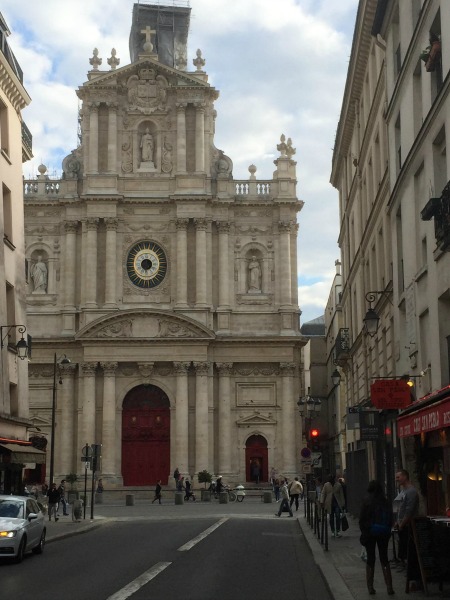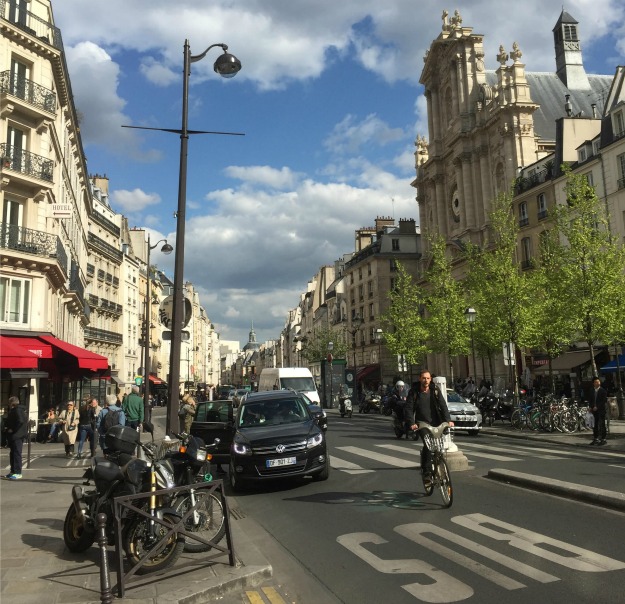This is a final installment of a 3-part series on author Tracy M. King-Sanchez’s writing life in Paris. Read Part 1 here and Part 2 here.
Born to two drug-addicted parents and placed in foster care at the age of four, I was fortunate enough to remain in the same home for 17 years. While never officially adopted, I would have a total of 12 foster siblings come and go over time. This incessant modification in family taught me to master the art of detached-attachment. I’ve come to accept stability as a mirage, and home as a temporary place to shelter you on days when the rest of the world becomes a bit too overbearing.
It’s been a little over a month since I bid adieu to another extended stay in Paris, and I’m missing it like crazy. In some ways, Paris has become my new foster home. It is not my birthplace, nor my birthright. I have no history there from which to draw, no ancestral ties to perpetuate. Instead, I struggle between wanting and needing the security that fails to blanket the part of me that will always feel like an outsider.
In December 2014, my husband and I celebrated our 20th wedding anniversary with a 10-day trip to Paris. A few weeks later, 17 people (20, if you include the gunmen) lost their lives in that city. A city I’d begun to love with a detached-attachment. I watched the news, reached out to a friend in Paris, and sat quietly as many voiced their opinions on Charlie Hebdo and its aftermath. This was yet another tumultuous chapter in the history of life. A history that not only teaches, but embeds us with fear, anger and flecks of hate, which, over time, coat our hearts and minds, pushing us to take stands and vows.
 While I remained guarded on the issue of Charlie Hebdo, I knew I had to get back to Paris. To see and feel for myself. To reach out and engage. And so, on March 29, 2015, I boarded a plane and returned, ready to embark on yet another journey of rediscovery. This time, instead of my voice, I came across this little thing called hope. If you blink, you’ll miss it. But there it was in the candid discussion I had with the charmingly-handsome sales clerk who spoke of the love and support his family gave their openly-gay son, as well as his own shame and frustration in knowing their support would flee the moment he brought home a black man. I glimpsed it in my exchange with an emotionally-drained Iranian Immigration Translator who made his way to the Jardin du Luxemburg at the end of each day in order to be reminded of the beauty in the world after spending hours translating the fears and desperation of those looking for a new place to call home. It sat on the shoulders of another sales clerk as we discussed the upcoming elections and her need to vote despite an overwhelming distrust in the political system that too often refused to acknowledge the voices of the young and disillusioned trapped in a vicious cycle of poverty. And it definitely stood watch over the weekly conversations I had with the owner of a Juice Bar as we dissertated the complexities in gentrification simultaneously undergoing both my beloved Brooklyn and coveted Paris.
While I remained guarded on the issue of Charlie Hebdo, I knew I had to get back to Paris. To see and feel for myself. To reach out and engage. And so, on March 29, 2015, I boarded a plane and returned, ready to embark on yet another journey of rediscovery. This time, instead of my voice, I came across this little thing called hope. If you blink, you’ll miss it. But there it was in the candid discussion I had with the charmingly-handsome sales clerk who spoke of the love and support his family gave their openly-gay son, as well as his own shame and frustration in knowing their support would flee the moment he brought home a black man. I glimpsed it in my exchange with an emotionally-drained Iranian Immigration Translator who made his way to the Jardin du Luxemburg at the end of each day in order to be reminded of the beauty in the world after spending hours translating the fears and desperation of those looking for a new place to call home. It sat on the shoulders of another sales clerk as we discussed the upcoming elections and her need to vote despite an overwhelming distrust in the political system that too often refused to acknowledge the voices of the young and disillusioned trapped in a vicious cycle of poverty. And it definitely stood watch over the weekly conversations I had with the owner of a Juice Bar as we dissertated the complexities in gentrification simultaneously undergoing both my beloved Brooklyn and coveted Paris.
I plan to return in November, to talk to more people, especially those who have been lost, forgotten or  tossed aside. Paris is filled with such people. America is filled with such people. The world is filled with such people. Like my definition of family and home, my definition of hope is ever evolving, changing, fluid. Hope lies in the ability to see past our own historically embedded beliefs and ideas of right and wrong, as we reach out to engage others. Sure, I could have taken offense to one person’s dismissing the frustration of immigrants, or another’s overwhelming support of nationalism, and yet another’s insistence that race is not an issue in France. Instead, I realized these men and women were simply striving for stability, struggling to maintain their footing in the messiness of their ever-changing world.
tossed aside. Paris is filled with such people. America is filled with such people. The world is filled with such people. Like my definition of family and home, my definition of hope is ever evolving, changing, fluid. Hope lies in the ability to see past our own historically embedded beliefs and ideas of right and wrong, as we reach out to engage others. Sure, I could have taken offense to one person’s dismissing the frustration of immigrants, or another’s overwhelming support of nationalism, and yet another’s insistence that race is not an issue in France. Instead, I realized these men and women were simply striving for stability, struggling to maintain their footing in the messiness of their ever-changing world.
Yet, these men and women are not endemic to Paris. Their suffering, their fears, their mistrust can be found in the streets of Cleveland, Baltimore and New York, where the chants of “Black Lives Matter!” blur the lines between a call for political action and humanitarian rights. Nor is the conflict of war intrinsic to Palestine and Israel, Russia and the Ukraine, North and South Korea, or America’s Industrial Prison Complex and the black, brown and tan faces used to feed this insatiable beast. The inability to protect future generations is by no means native to Myanmar, Nigeria, Iraq or any other country inhabited on this hot-mess of a globe we call home.
Paris is messy. Ferguson is messy. North Carolina is messy. McKinney is messy. Sudan is messy. Somalia is messy. China is messy. India is messy. Dominican Republic is messy. America is messy. Life is messy. And, by messy, I mean fucked-up.
But there is always hope. There must always be hope. Whether hope is faith or trust or simply love, it’s a seed that leads to growth.
I was supposed to write about my reawakening in Paris, the rediscovery of my voice and its impact on my life as a writer. And I have. Paris, my foster home, the place of my artistic rebirth, has taught me that while you can take the child out of foster care, that child will always have the need to foster the voices of those screaming out to be heard, no matter where she decides to lay down roots.
Thank you, Paris. Je t’adore.
Tracy M. King-Sanchez is a writer and filmmaker. Follow her on Twitter at @tkingsanchez.



